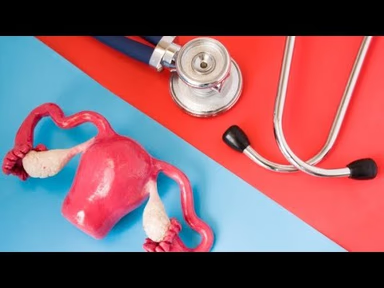
Video: How much does PCOS affect fertility?
Peer reviewed by Dr Krishna Vakharia, MRCGPLast updated by Amberley DavisLast updated 1 Jun 2023
Meets Patient’s editorial guidelines
- DownloadDownload
- Share
- Language
- Discussion
With PCOS leading to so many subsequent problems, it's no wonder that many women have a lot of questions about the condition. Our experts have the answers to some of them.
In this article:
Playlist: PCOS Q&A
8 videos
How much does PCOS affect fertility?
Dr Sarah Jarvis MBE, FRCGP
How much does PCOS affect fertility?
Dr. Sarah Jarvis MBE, FRCGP

Does PCOS affect weight?
Dr. Sarah Jarvis MBE, FRCGP

How many cysts do you have to have to be diagnosed with PCOS?
Dr. Sarah Jarvis MBE, FRCGP

How often is PCOS misdiagnosed?
Dr. Sarah Jarvis MBE, FRCGP

Can PCOS cysts rupture?
Dr. Sarah Jarvis MBE, FRCGP

Can PCOS be cured?
Dr. Sarah Jarvis MBE, FRCGP

How do sufferers of PCOS ovulate?
Dr. Sarah Jarvis MBE, FRCGP

How often should PCOS be checked?
Dr. Sarah Jarvis MBE, FRCGP
Continue reading below
How much does PCOS affect fertility?
PCOS or polycystic ovary syndrome is one of the most common reasons for women having problems getting pregnant. Although you have lots of follicles, which are the tiny little cysts that eggs usually develop in, the abnormal balance of hormones in your ovaries means those eggs don't develop properly and you don't ovulate regularly. However, treatment to cause you to ovulate is often effective and can restore fertility in PCOS.
Does PCOS affect weight?
The answer in many cases is yes. But the relationship between weight and PCOS is really complicated. PCOS is largely down to an imbalance of hormones, particularly, in excess of the male hormone testosterone that can make you more prone to putting on weight - and in particular to putting on weight around your tummy. But we know that women who are of overweight produce more of a hormone called insulin and if their bodies are resistant to insulin or does not respond properly to it, that can make the symptoms of PCOS as worse.
It also increases the risk of type 2 diabetes. So there is a complex relationship going on between PCOS and weight. Some women who are normal weight do have PCOS, but you are much more likely to have PCOS if you are overweight. On the plus side, if you could lose just five to seven percent of your weight and ideally get down towards the ideal range of BMI - that is, the ratio of your weight to your height - you can significantly improve your symptoms.
Continue reading below
How many cysts do you have to have to be diagnosed with PCOS?
You can have polycystic ovaries without having polycystic ovary syndrome. To have polycystic ovaries you have to have at least twelve tiny follicles or cysts on your ovaries. To have polycystic ovary syndrome you also have to have:
An abnormally high level of the male hormones called androgens, particularly, testosterone and an abnormal balance of female hormones in your system
Not ovulating regularly, so you may have irregular or absent periods.
How often is PCOS misdiagnosed?
The early symptoms of PCOS can be fairly vague, so they might be missed. But, the criteria we use to diagnose PCOS are pretty straightforward. You have to have two out of three things. Those three things are:
multiple cysts, at least twelve on your ovaries on ultrasound;
either evidence of high levels of testosterone in your blood and an abnormal balance of the female hormones or the symptoms that come out of that. So excess body hair, acne, sometimes thinning of the hair on your scalp
not ovulating regularly, which may mean you have irregular or absent periods.
PCOS is more common in women who are overweight, so it may well be more likely that you will be misdiagnosed or not diagnosed with PCOS if you are of normal weight.
Continue reading below
Can PCOS cysts rupture?
We do hear about ovarian cysts rupturing, twisting, getting blocked and causing severe pain. However, the cysts in polycystic ovary syndrome tend to be very small - smaller or about the size of the normal follicle that you would produce every month if you were ovulating regularly.
Therefore, if those cysts do rupture, it could be because they are producing an egg, but if it's not, they are unlikely to cause severe problems.
Can PCOS be cured?
Although PCOS can't be cured, there is lots that you can do to improve your symptoms. PCOS is largely down to an imbalance of hormones and stopping smoking can improve that balance.
A lot of women with PCOS are overweight. That's partly a consequence of PCOS. But it can also make symptoms worse. So, although it can be difficult to lose weight if you have PCOS, getting even five percent of your excess weight down can make a real difference to your symptoms.
How do sufferers of PCOS ovulate?
Normally, ovulation - producing an egg - involves an egg follicle in your ovary growing and, when its ripe, rupturing releasing that egg. In PCOS, you have lots of those follicles. But the abnormal balance of hormones that are needed for the egg to develop often means that the egg does not develop normally.
Fortunately, for most women with PCOS, treatment to bring on ovulation is successful, which is great news, if you are trying to get pregnant.
How often should PCOS be checked?
Women with PCOS often produce too much of the hormone insulin or their bodies are resistant to it. In other words, they can't process it. That increases their risk of type 2 diabetes and of heart disease.
It's important to get checked once a year to make sure that you are not moving towards a diagnosis of type 2 diabetes. It is also important to have iat least three periods a year, because the high levels of oestrogen that circulate when you got PCOS can increase your risk of cancer of the womb lining. Hormone treatments can often help to give you regular periods which will reduce this risk.
Patient picks for PCOS

Hormones
8 common myths about PCOS (Polycystic Ovary Syndrome)
Polycystic ovary syndrome is one of the most common yet misunderstood women's health conditions. With misinformation circulating the internet, we sort fact from fiction and explore how myths about PCOS might be harming women with this condition.
by Amberley Davis

Hormones
How to cope with a PCOS diagnosis
PCOS affects between 1 in 7 and 1 in 20 women of childbearing age but despite how common it is, it's not always easy to deal with a diagnosis, especially if you're confused or unsure about what it means for your health or your future.
by Lydia Smith
Continue reading below
Article history
The information on this page is peer reviewed by qualified clinicians.
Next review due: 1 Jun 2026
1 Jun 2023 | Latest version
18 Mar 2018 | Originally published
Authored by:
Dr Sarah Jarvis MBE, FRCGP

Ask, share, connect.
Browse discussions, ask questions, and share experiences across hundreds of health topics.

Feeling unwell?
Assess your symptoms online for free
Sign up to the Patient newsletter
Your weekly dose of clear, trustworthy health advice - written to help you feel informed, confident and in control.
By subscribing you accept our Privacy Policy. You can unsubscribe at any time. We never sell your data.